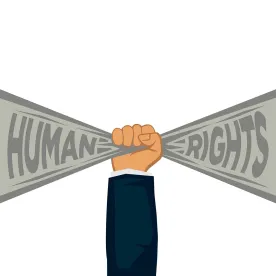Following a series of high-profile, widely condemned human rights violations, including the torture and killing of Sergei Magnitsky and the killing of Jamal Khashoggi, a coalition of western nations have developed global human rights (“GHR”) sanctions regimes. The aim of this action is to coordinate—and thereby compound the impact of—coercive economic measures to deter and punish grave human rights violations. As discussed below, the European Union and United Kingdom recently joined the United States, Canada, Estonia, Latvia, and Lithuania in establishing a mechanism to shut off designated persons’ and entities’ access to key financial markets.
Following a discussion of the U.S., EU, and UK sanctions programs, we share insights for our clients and friends in navigating burgeoning global sanctions compliance obligations.
United States GHR Sanctions Framework
The United States was the first nation to develop a human rights sanctions regime with the passing of the Global Magnitsky Human Rights Accountability Act (the “Global Magnitsky Act”) [1] in 2016. The United States introduced human rights sanctions initially under the Sergei Magnitsky Rule of Law Accountability Act of 2012,[2] in response to the detention, mistreatment, and death of Sergei Magnitsky, a tax attorney in Russia who exposed Russian government corruption.[3] The Global Magnitsky Act followed shortly thereafter.
The Global Magnitsky Act authorizes the President to impose sanctions (now commonly known as “Magnitsky Sanctions”) on “foreign persons”[4] (including individuals and entities) responsible for or participating in certain “extrajudicial killings, torture, or other gross violations of internationally recognized human rights committed against individuals in any foreign country,” as well as those responsible for, or complicit in, forms of significant corruption.[5] For individuals, sanctions pursuant to the Global Magnitsky Act include “ineligibility to receive a visa … or to be admitted” to the United States and revocation of previously issued visas.[6] Sanctions on individuals and entities also may include blocking of “all transactions in all property and interests” in accordance with the International Emergency Economic Powers Act (“IEEPA”).[7]
The Global Magnitsky Act was passed on December 23, 2016, and implemented by President Trump in Executive Order 13818 on December 20, 2017, with the imposition of Magnitsky Sanctions on 13 “serious human rights abusers and corrupt actors.”[8]
While the initial targets were the Russian officials deemed responsible for the acts against Sergei Magnitsky, the regime has now been used to target numerous individuals and entities involved in human rights abuses across the globe.
In 2018, for example, the United States imposed Magnitsky Sanctions on 17 Saudi private actors found to be involved in the killing of dissident journalist Jamal Khashoggi.[9] Magnitsky Sanctions have also been used to target corruption, such as in the October 2019 actions against private actors in South Africa for the corrupt use of government contracts and bribery to influence politicians[10] and individuals of South Sudan for “bribery, kickbacks and procurement fraud with senior government officials,” draining money necessary to support South Sudanese people.[11]
More recently, 2020 saw significant use of Magnitsky Sanctions as part of a coordinated effort across the U.S. Departments of State, Treasury, Commerce, and Homeland Security to address human rights abuses occurring in the Xinjiang Uyghur Autonomous Region of China.[12] Following closely on the heels of this landmark step in the crackdown on human rights offences, Canada introduced its own Magnitsky-style laws in 2017.[13]
United Kingdom GHR Sanctions Framework
While there was significant pressure on the European Union to take a similar stance, it seemingly eluded the (then) 28 member states to legislate on the issue. However, following Brexit, the United Kingdom was able to use its new autonomous sanctions regime to enact a GHR framework, with the European Union following shortly thereafter.
The UK human rights sanctions regime came into force on July 6, 2020, pursuant to the Global Human Rights Sanctions Regulations 2020[14] “to champion human rights, good governance and the rule of law.”[15] Under the new UK laws, individuals or entities can be sanctioned where they are responsible for or involved in “serious violations”[16] of the following human rights:
-
the right to life;
-
the right not to be subjected to torture or cruel, inhuman or degrading treatment or punishment; and
-
the right to be free from slavery, not to be held in servitude or required to perform forced or compulsory labour.[17]
The restrictions apply to companies and individuals in the United Kingdom, in addition to “UK persons outside the UK, and … by any person in the territorial sea adjacent to the UK.” [18] The measures impose financial sanctions on designated individuals and entities, which include “an asset-freeze, ensuring a designated person’s funds and economic resources (non-monetary assets, such as property or vehicles) are not dealt with, and ensuring that funds and economic resources are not made available to or for the benefit of a designated person, either directly or indirectly.”[19]
The regime was launched with 49 designations (47 individuals and 2 entities), comprising:
-
25 Russian officials who were reported to be involved in the mistreatment and death of Magnitsky;
-
20 Saudi Arabian officials linked to the 2018 unlawful killing of Jamal Khashoggi at the Saudi Consulate in Istanbul;
-
2 high-ranking commanders of the Myanmar Armed Forces linked to atrocities and serious human rights violations against the Rohingya population; and
-
2 North Korean entities involved in running prison camps and serious human rights violations.[20]
The United Kingdom has followed these initial listings with six additional waves of designations relating to:
-
violence against protesters following the allegedly rigged elections in Belarus;[21]
-
torture against the LGBT community in Chechnya (Russia);[22]
-
police encounter deaths in Pakistan;[23]
-
“historic human rights violations including extrajudicial killings of protestors and minority groups” in The Gambia;[24]
-
extrajudicial killings and torture in Venezuela;[25]
-
violence used to “suppress the Maidan protest movement” in Ukraine;[26] and
-
torture or cruel, inhuman or degrading treatment against Uyghurs and other minorities in Xinjiang. These designations were made alongside the European union, Canada and the United States.[27]
As at the date of writing, there are currently 72 individuals and 6 entities on the UK’s global human rights sanctions list. The sanctions relate to 11 different events which violated the human rights of others (most commonly either the right to life or the right not to be subjected to torture, as discussed above).
European Union GHR Sanctions Framework
The European Union quickly followed the United Kingdom in formally unveiling its analogous human rights regime, which came into force in December 2020 by way of Council Regulation (EU) 2020/1998.[28] Like the UK measures, the EU regime allows the European Union to impose asset freezes and travel bans, and to restrict regulated persons from making funds available to designated individuals and entities. This was seen as significant in the crackdown on human rights abuses as it excludes offenders from entering the markets, or the territory, of all 27 member states.
The EU measures are wider in scope than their UK counterparts and cover additional human rights violations “including, but not limited to”[29] human trafficking, sexual or gender-based violence and freedom of opinion, assembly, and religion. President of the European Commission Ursula von der Leyen welcomed the implementation of the new regime, noting that “an EU sanctions regime that holds to account those responsible for abuses and violations of human rights is long overdue.”[30]
Despite encompassing a greater range of sanctionable offences, to date the EU GHR regime has been used more sparsely. Currently, only 15 individuals and 4 entities are listed. It remains to be seen whether this regime will be used as liberally as the other GHR regimes given possible conflicting policy considerations of the 27 states involved, which may prevent any nimble action.
The GHR sanctions regimes can be used to target human rights violations across the world, irrespective of any nexus to the sanctioning jurisdiction. With the unveiling of the European Union’s new regime, Foreign Affairs Minister Josep Borrell highlighted that a global regime is required to “gain more flexibility to go after the perpetrators regardless of where they are and dispenses us from having to set up a specific legal framework each time for each specific case.”[31]
To date, the EU measures have been used in response to the following human rights violations:
-
those involved in the poisoning and detention of Alexey Navalny;[32],[33]
-
Russian officials responsible for arbitrary arrests and detentions;[34]
-
Individuals and entities from China, the Democratic People’s Republic of Korea, Libya, Eritrea, South Sudan and Russia alleged to be responsible for “torture, extrajudicial killings, enforced disappearances or systematic use of forced labour.” [35]
Coordinated Sanctions Activity
With these four sanctions regimes up and running, there has been a notable increase in the use of thematic sanctions in a coordinated effort to expose and deter human rights violations on the global stage. The coordination amplifies the impact of the measures by shutting off access to the financial systems of an increased number of global economies. Known as the “bite” of the sanctions, this has undoubtedly gotten sharper.
In March, the sanctioning jurisdictions acted in concert to impose restrictions against a number of Chinese officials in response to alleged human rights abuses in the Xinjiang region. Canada, the United Kingdom, and the United States released a joint statement[36] noting that the intention of the measures, which were made in parallel with EU sanctions, demonstrate that the nations “are united in calling for China to end its repressive practices against Uyghur Muslims and members of other ethnic and religious minority groups in Xinjiang, and to release those arbitrarily detained.” [37]
The various states have also acted together to target perpetrators of recent human rights abuses in Belarus “in response to the 23 May forced landing of a commercial Ryanair flight between [two] EU member states and the politically motivated arrest of journalist Raman Pratasevich and his companion Sofia Sapega, as well as to the continuing attack on human rights and fundamental freedoms.”[38]
On June 21, 2021, the governments of Canada, the United Kingdom, the United States, and the European Union released a joint statement “calling for the regime to end its repressive practices against its own people.” [39] The benefit of the coordinated nature of these actions is that it is more of a challenge for those targeted to be able to circumvent their impact by jurisdiction shopping.
Retaliatory Sanctions by GHR Targets
However, with the increase in designations under the thematic regimes by these four powers, there has been a corresponding surge in the use of retaliatory sanctions by their targets. Russia was the first nation to threaten use of this tool following measures introduced by the United Kingdom and the United States in response to the nerve agent attack on Sergei and Yulia Skripal in Salisbury in 2018. Measures included U.S. sanctions[40] and the expulsion of “undeclared [Russian] intelligence officers” from the United Kingdom and the United States.[41]
In retaliation, Russian prime minister Dmitry Medvedev noted that “if they introduce something like a ban on banking operations or the use of any currency, we will treat it as a declaration of economic war. And we’ll have to respond to it accordingly — economically, politically or in any other way, if necessary.”[42]
In November 2020, Russia imposed reciprocal sanctions[43] on 25 British representatives following the unveiling of their human rights sanctions regime and immediate designation of 25 Russian officials.
More recently, China and Belarus have also introduced “tit for tat” sanctions in response to the imposition of human rights sanctions. Measures include the sanctioning of U.S. and Canadian nationals, EU and UK politicians and a think tank in response to the coordinated sanctions imposed in relation to Xinjiang human rights abuses.[44] Meanwhile Belarus imposed a travel ban on officials from Estonia, Latvia, and Lithuania[45] responding to the Baltic countries’ measures taken against Alexander Lukashenko and 29 other officials following the allegedly rigged elections in Belarus.[46]
Compliance Takeaways – Navigating Global Sanctions Regimes
As new sanctions regimes emerge, the compliance on global businesses increases. Actors that are subject to the sanctions regimes of the various jurisdictions in which they operate will need to identify which jurisdictions’ sanctions apply to their operations and search applicable databases which, at least to date, are not linked.
Moreover, there may be instances where actors will need to navigate conflicting sanctions regulations. Factors such as geopolitics will lead to divergences in how the sanctioning jurisdictions develop their respective regimes. This creates complexities for companies trying to understand their obligations and fulfill their compliance obligations.
Additionally, more GHR frameworks may be forthcoming, further adding to the compliance burden for some clients. Notably, in August this year, Australia introduced its International Human Rights and Corruption (Magnitsky Sanctions) Bill 2021, which is currently set to come into force by the end of 2021.[47] The delay in the establishment of Australia’s long awaited GHR sanctions regime likely reflects the geopolitical complexities of these measures. It has been reported that Australia’s vital trading relationship with China may have been linked to its reticence in expediting the GHR sanctions legislation because the recent focus of the coordinated measures was human rights abuses in Xinjiang.[48] Undoubtedly, geopolitics will continue to impact the use of these measures as the various nascent GHR regimes develop.
[1] Global Magnitsky Human Rights Accountability Act, Pub. L. No. 114-328, div. A, title XII, subtitle F, 130 Stat. 2533 (2016) (codified at 22 U.S.C. § 2656 note).
[2] Sergei Magnitsky Rule of Law Accountability Act of 2012, Pub. L. No. 112-208, 126 Stat 1496 (2012).
[3] Global Magnitsky Human Rights Accountability Act, Pub. L. No. 114-328, div. A, title XII, subtitle F, § 1262(1), 130 Stat. 2533 (2016) (codified at 22 U.S.C. § 2656 note).
[4] Id. at § 1263(a), 130 Stat. 2534.
[5] Id. at § 1263(b), 130 Stat. 2534.
[6] Id. at § 1263(b)(2)(A), 130 Stat. 2534.
[7] Id. (50 U.S.C. § 1701 et seq.)
[8] Executive Order 13818 of December 20, 2017, Blocking the Property of Persons Involved in Serious Human Rights Abuse or Corruption, 82 Fed. Reg. 60839 (Dec. 20, 2017).
[9] Press Release, U.S. Dep’t of the Treasury, Treasury Sanctions 17 Individuals for Their Roles in the Killing of Jamal Khashoggi (Nov. 15, 2018), https://home.treasury.gov/news/press-releases/sm547.
[10] Press Release, U.S. Dep’t of the Treasury, Treasury Sanctions Members of a Significant Corruption Network in South Africa (Oct. 10, 2019), https://home.treasury.gov/news/press-releases/sm789.
[11] Press Release, U.S. Dep’t of the Treasury, Treasury Sanctions Businessmen in South Sudan for Corrupt Dealings with Government Officials and Sanctions Evasion (Oct. 11, 2019), https://home.treasury.gov/news/press-releases/sm790.
[12] Press Release, U.S. Dep’t of the Treasury, Treasury Sanctions Chinese Entity and Officials Pursuant to Global Magnitsky Human Rights Executive Order (July 31, 2020), https://home.treasury.gov/news/press-releases/sm1073.
[13] Justice for Victims of Corrupt Foreign Officials Act (Sergei Magnitsky Law), S.C. 2017, c. 21.
[14] The Global Human Rights Sanctions Regulations 2020, SI 2020/680.
[15] The Global Human Rights Sanctions Regulations 2020, Explanatory Memorandum 7.1.
[16] The Global Human Rights Sanctions Regulations 2020, SI 2020/680, art. 4, 2.
[17] Id.
[18] The Global Human Rights Sanctions Regulations 2020, Explanatory Memorandum 4.3.
[19] Id. at 7.4.
[20] United Kingdom Press Release, UK announces first sanctions under new global human rights regime (July 6, 2020), https://www.gov.uk/government/news/uk-announces-first-sanctions-under-new-global-human-rights-regime.
[21] United Kingdom Press Release, Belarus: UK sanctions 8 members of regime, including Alexander Lukashenko (Sep. 29, 2020), https://www.gov.uk/government/news/belarus-uk-sanctions-eight-members-of-regime-including-alexander-lukashenko.
[22] United Kingdom Press Release, UK announces travel bans and asset freezes for human rights violators (Dec. 10, 2020), https://www.gov.uk/government/news/uk-announces-travel-bans-and-asset-freezes-for-human-rights-violators.
[23] Id.
[24] Id.
[25] Id.
[26] Office of Financial Sanctions Implementation, HM Treasury, Financial sanctions targets: list of all asset freeze targets, Government of the United Kingdom (Sep. 30, 2021), https://www.gov.uk/government/publications/financial-sanctions-consolidated-list-of-targets/consolidated-list-of-targets.
[27] United Kingdom Press Release, UK sanctions perpetrators of gross human rights violations in Xinjiang, alongside EU, Canada and US (Mar. 22, 2021), https://www.gov.uk/government/news/uk-sanctions-perpetrators-of-gross-human-rights-violations-in-xinjiang-alongside-eu-canada-and-us.
[28] Council Regulation 2020/1998, 2020 O.J. (L 410/1) (EU).
[29] Id. at art. 2(1)(d).
[30] European Commission Press Release IP/20/1939, Sanctions and Human Rights: towards a European framework to address human rights violations and abuses worldwide (Oct. 19, 2020), https://ec.europa.eu/commission/presscorner/detail/en/ip_20_1939.
[31] Josep Borrell, The long and complex road towards an EU Global Human Rights Sanctions Regime, European External Action Service (Oct. 31, 2020), https://eeas.europa.eu/headquarters/headquarters-homepage/87884/long-and-complex-road-towards-eu-global-human-rights-sanctions-regime_en.
[32] Council Implementing Regulation 2021/371, 2021 O.J. (L.I. 71/1) (EU).
[33] Note that this human rights violation falls within the remit of The Chemical Weapons (Sanctions) (EU Exit) Regulations 2019, SI 2019/618 in the UK.
[34] Council Implementing Regulation 2021/478, 2021 O.J. (L.I. 99/1) (EU).
[35] Id.
[36] United Kingdom Press Release, Human rights violations in Xinjiang: Canada, UK and US joint statement (Mar. 22, 2021), https://www.gov.uk/government/news/joint-statement-canada-uk-and-us-statement-on-xinjiang.
[37] Id.
[38] United Kingdom Press Release, Belarus sanctions: joint statement by Canada, the EU, UK, and US (June 21, 2021), https://www.gov.uk/government/news/belarus-sanctions-joint-statement-by-canada-the-eu-uk-and-us.
[39] Id.
[40] Catherine Philp, Fiona Hamilton & Boer Deng, US to sanction Russia over Skripal poisoning, The Times (Aug. 9, 2018), https://www.thetimes.co.uk/article/us-to-sanction-russia-over-skripal-poisoning-mmnmjqm9g.
[41] Catherine Philp & Boer Deng, West to expel 100 Russian diplomats over Salisbury attack, The Times (Mar. 26, 2018), https://www.thetimes.co.uk/article/west-to-expel-100-russian-diplomats-over-salisbury-attack-m3jndpbvf.
[42] Marc Bennetts, Russian prime minister warns America against economic war, The Times (Aug. 11, 2018), https://www.thetimes.co.uk/article/russian-prime-minister-warns-america-against-economic-war-fq702350w.
[43] Federal’nyi Zakon 1996 goda No 114-FZ Au Poryadkoye Vyezda iz Rossiiskoi Federatsii yi Vyezda vie Rossiiskoi Federatsii [Federal Law No. 114-FZ of 1996 on the Procedure for Exit from the Russian Federation and Entry Into the Russian Federation], Sobranie Zakonodatel’stva Rossiiskoi Federatsii [SZ RF] [Russian Federation Collection of Legislation] 1996, No. 34.
[44]China targets UK lawmakers, others in response to Xinjiang sanctions, DW (Mar. 26, 2021), https://www.dw.com/en/china-targets-uk-lawmakers-others-in-response-to-xinjiang-sanctions/a-57008984.
[45] Belarus to impose retaliatory sanctions against Baltic states, foreign minister says, Reuters (Sep. 2, 2020), https://www.reuters.com/article/uk-belarus-election-sanctions-idUKKBN25T1NH.
[46] Baltic states extend travel ban to more Belarus officials, Reuters (Sep. 25, 2020), https://www.reuters.com/article/us-belarus-election-sanctions-idUSKCN26G1YM.
[47] International Human Rights and Corruption (Magnitsky Sanctions) Bill 2021 (Cth) (Austl.).
[48] United Kingdom Press Release, Human rights violations in Xinjiang: Canada, UK and US joint statement (Mar. 22, 2021), https://www.gov.uk/government/news/joint-statement-canada-uk-and-us-statement-on-xinjiang




 />i
/>i
